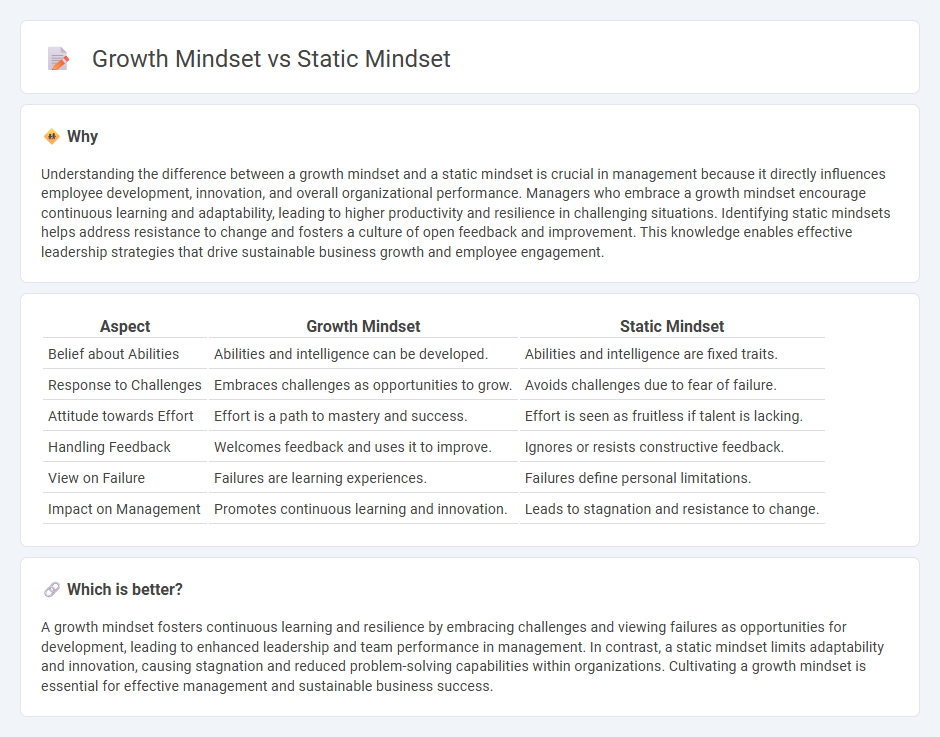
A growth mindset embraces challenges and views failure as an opportunity to learn, fostering continuous development in management skills. In contrast, a static mindset limits potential by avoiding risks and believing abilities are fixed traits. Explore how adopting a growth mindset can transform leadership effectiveness and organizational success.
Why it is important
Understanding the difference between a growth mindset and a static mindset is crucial in management because it directly influences employee development, innovation, and overall organizational performance. Managers who embrace a growth mindset encourage continuous learning and adaptability, leading to higher productivity and resilience in challenging situations. Identifying static mindsets helps address resistance to change and fosters a culture of open feedback and improvement. This knowledge enables effective leadership strategies that drive sustainable business growth and employee engagement.
Comparison Table
| Aspect | Growth Mindset | Static Mindset |
|---|---|---|
| Belief about Abilities | Abilities and intelligence can be developed. | Abilities and intelligence are fixed traits. |
| Response to Challenges | Embraces challenges as opportunities to grow. | Avoids challenges due to fear of failure. |
| Attitude towards Effort | Effort is a path to mastery and success. | Effort is seen as fruitless if talent is lacking. |
| Handling Feedback | Welcomes feedback and uses it to improve. | Ignores or resists constructive feedback. |
| View on Failure | Failures are learning experiences. | Failures define personal limitations. |
| Impact on Management | Promotes continuous learning and innovation. | Leads to stagnation and resistance to change. |
Which is better?
A growth mindset fosters continuous learning and resilience by embracing challenges and viewing failures as opportunities for development, leading to enhanced leadership and team performance in management. In contrast, a static mindset limits adaptability and innovation, causing stagnation and reduced problem-solving capabilities within organizations. Cultivating a growth mindset is essential for effective management and sustainable business success.
Connection
Growth mindset and static mindset represent contrasting beliefs about abilities, where a growth mindset embraces challenges as opportunities to develop skills through effort and learning, while a static mindset assumes abilities are fixed and unchangeable. These mindsets directly influence management styles, employee motivation, and organizational culture by shaping how individuals approach problem-solving, feedback, and personal development. Cultivating a growth mindset within management fosters innovation, resilience, and continuous improvement, driving sustainable business success.
Key Terms
Fixed Beliefs
A static mindset revolves around fixed beliefs, where individuals perceive intelligence and abilities as innate and unchangeable, often leading to avoidance of challenges and fear of failure. In contrast, a growth mindset embraces the understanding that skills and intelligence can be developed through effort, learning, and persistence, fostering resilience and motivation. Explore more about how shifting from a static mindset to a growth mindset can transform your personal and professional life.
Learning Orientation
A static mindset views intelligence and abilities as fixed traits, limiting personal development and resilience when faced with challenges. In contrast, a growth mindset embraces learning orientation by believing skills can be developed through effort, fostering adaptability and continuous improvement. Explore how adopting a growth mindset can transform your approach to learning and success.
Adaptability
A growth mindset fosters adaptability by encouraging learning from challenges and embracing change as an opportunity for development, while a static mindset limits flexibility by fixating on innate abilities and fearing failure. Emphasizing adaptability enhances problem-solving skills and resilience in dynamic environments. Explore how cultivating a growth mindset can transform your approach to change and success.
Source and External Links
Why a Static Mindset Contributes to Depression and the Importance to Update Your Mindset - This article discusses how a static mindset, characterized by a fixed perception of one's abilities, can contribute to depression and emphasizes the importance of adopting a growth mindset for personal development.
Growth Mindset and How You Can Change Your Way of Thinking - This webpage contrasts static and growth mindsets, highlighting that a static mindset views effort as unnecessary and feedback as personal criticism, while a growth mindset sees effort as a means to improve and feedback as an opportunity for growth.
Growth vs. Fixed Mindset - This document explains the difference between a fixed mindset, which believes qualities like intelligence are unchangeable, and a growth mindset, which believes these qualities can be developed over time.
 dowidth.com
dowidth.com